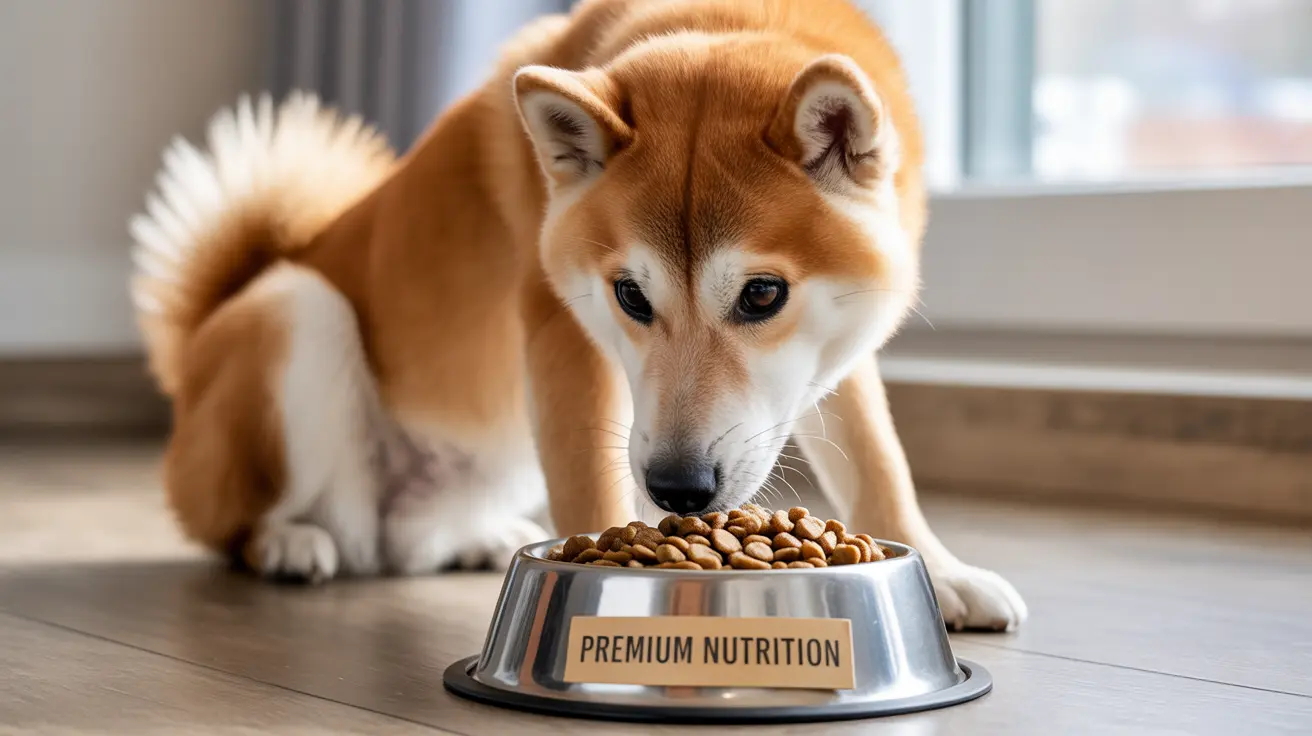A Shiba Inu dog looking at a bowl of dry dog food labeled 'Premium Nutrition'.
{
"title": "How to Choose the Best Dog Food in 2025: Expert Guidance and Top Recommendations",
"subtitle": "Discover the essential tips and expert insights you need for selecting the perfect nutrition for your dog in 2025.",
"name_en": "How to Choose the Best Dog Food in 2025: Expert Guidance and Top Recommendations",
"news_category": "nutrition-wellness",
"short_description": "Explore expert-backed recommendations and tips for selecting the best dog food in 2025 to meet your pet's nutritional needs.",
"long_description": "
Navigating the complex world of dog nutrition can feel overwhelming, especially with the countless options available in the market today. As we move into 2025, understanding how to choose the best dog food for your furry friend has become more crucial than ever. This comprehensive guide will help you make informed decisions about your dog's nutrition, ensuring they receive the optimal balance of nutrients for their specific needs.
Whether you're a new pet parent or looking to upgrade your dog's current diet, this expert-backed guide covers everything from basic nutritional requirements to specific recommendations for various health conditions. We'll explore vet-recommended options, analyze premium brands, and discuss how to balance quality with affordability.
Understanding the Foundations of Canine Nutrition
Dogs require a precise balance of nutrients to maintain optimal health. A complete and balanced dog food must offer all the essential dietary elements needed for their body functions, growth, and activity. Each nutrient plays a unique and vital role in your dog's well-being.
- Proteins: Essential for muscle development, tissue repair, enzyme production, and overall growth. High-quality animal proteins should be a significant component of your dog's diet.
- Fats: Fats are the main energy source. They also aid in vitamin absorption, support healthy skin, and keep your dog's coat shiny and smooth.
- Carbohydrates: Though not always essential, carbohydrates provide accessible energy, add fiber for digestive health, and help maintain optimal blood sugar levels.
- Vitamins and Minerals: Crucial for immunity, bone health, nerve function, and enzymatic processes. An imbalance or deficiency can lead to significant health issues.
- Water: The most vital nutrient, water is necessary for all metabolic activities and the prevention of dehydration.
The Importance of Natural Ingredients
Natural dog food ingredients form the cornerstone of premium nutrition. Ideally, quality named animal proteins should be listed first on the ingredient panel—think chicken, beef, fish, or lamb. The benefits of dog food are maximized when these ingredients are minimally processed, free from artificial additives, and any by-products or fillers. Opting for formulas with recognizable, natural ingredients helps support long-term health and minimizes potential allergens or sensitivities.
Veterinary Guidance in Dog Food Selection
Professional veterinary input is invaluable when selecting your dog's food. Veterinarians can provide tailored nutritional advice and help identify foods that are certified by organizations such as the Association of American Feed Control Officials (AAFCO), ensuring your dog's nutritional needs are thoroughly met. Vets can also recommend foods that are suited to your pet's age, breed, weight, and potential medical concerns, optimizing their wellness through targeted nutrition.
Special Dietary Considerations
Some dogs require specialized nutrition to manage health conditions or sensitivities. It's important to select formulas designed specifically for these needs for best results and to promote your dog's overall comfort and well-being. Common specialized diets include:
- Hypoallergenic dog food: Suitable for pets with food sensitivities or allergies, these foods avoid common allergens and use unique protein sources.
- Dog food for allergies: Often feature limited ingredient formulas, focusing on simple recipes to minimize adverse reactions.
- Dog food for sensitive stomachs: Designed to be gentle on digestion with easily digestible ingredients and added prebiotics.
- Protein-rich dog food for active breeds: Active and working dogs benefit from higher protein and calorie content to meet their elevated energy demands.
Top Dog Food Recommendations for 2025
Best Overall Choice
Hill's Science Diet consistently ranks at the top of veterinarian-recommended lists for its well-researched and nutritionally balanced formulas. Known for their high-quality ingredients and complete nutrition, Hill's Science Diet gives pet owners confidence in their dog's daily diet, providing options for every life stage and health requirement.
Premium Options for Specific Needs
- Sensitive Systems: Purina Pro Plan, according to recent reviews, provides excellent results for digestive health and sensitive stomachs by offering easily digestible ingredients and specific probiotics to support gut flora.
- Picky Eaters: Royal Canin is formulated for enhanced palatability and aroma, encouraging even fussy dogs to eat healthily without compromise.
- Weight Management: Specialized dog food formulas aimed at weight control help reduce calories while maintaining the necessary balance of protein, fiber, and nutrients for healthy weight loss or maintenance.
- Active Dogs: High-energy formulas for active breeds, such as those involved in sporting or working activities, deliver increased protein and fat levels to sustain vigorous exercise and muscle recovery.
Making Cost-Effective Choices
While premium dog food brands often provide superior nutrition, it is possible to find affordable options that do not compromise your pet's health. When shopping on a budget, consider the following:
- Look for a balance of quality ingredients and price; often, mid-range brands deliver excellent nutrition without premium costs.
- Choose reputable manufacturers with solid safety records, as established brands tend to maintain better quality control.
- Prioritize foods that meet AAFCO's complete nutrition certification to ensure all dietary requirements are addressed.
- Opt for products with natural preservatives, such as vitamin E (mixed tocopherols), over artificial chemicals.
With diligent research, you can provide great nutrition without exceeding your budget.
Special Considerations for Different Life Stages
Puppy Nutrition
Puppy food recommendations prioritize higher protein and calorie levels to supply energy for rapid growth, brain development, and immune function. Formulas may also include DHA for healthy vision and cognitive development, setting the foundation for a healthy adult life.
Adult Maintenance
By adulthood, dogs need diets that support ongoing health without excess calories. Adult dog food formulations for 2025 offer balanced proteins, carbohydrates, and healthy fats, sometimes with targeted nutrition to address specific issues like skin sensitivities or activity level.
Senior Care
Senior dog food is specifically crafted to support aging pets by including joint-supporting supplements such as glucosamine and chondroitin, increased fiber for digestive health, and careful calorie adjustments to prevent weight gain as activity declines.
Frequently Asked Questions
- What is the best overall vet-recommended dog food for 2025? Hill's Science Diet is widely recommended for its balanced nutrition and value, supporting dogs at any life stage.
- Which dog food is best for sensitive digestive systems? Purina Pro Plan offers specialized formulas with probiotics and easy-to-digest ingredients for sensitive stomachs.
- What dog food is recommended for picky eaters? Royal Canin is known for palatable recipes and unique kibble shapes, making it appealing to fussy canines.
- How do I ensure my dog's food meets nutritional standards? Always choose foods that state compliance with AAFCO nutritional standards and, when in doubt, consult your veterinarian for guidance.
- Is there a good dog food for weight management? Yes, many brands, including Hill's Science Diet and Purina, produce weight control formulations to support healthy body weight.
- What foods help maintain my dog's dental health? Certain kibbles are designed in shape and texture to help clean teeth and reduce plaque buildup, with alternatives including dental treats approved by veterinarians.
- Are there budget-friendly yet healthy dog food options? Affordable, healthy choices do exist; many reputable brands offer economy lines that meet dietary requirements without unnecessary additives.
- What should I look for in dog food for active lifestyles? For active dogs, seek out high-protein, energy-dense formulas with quality animal fats and added antioxidants for recovery.
- Should puppy and senior dogs eat different food? Absolutely—life stage-specific nutrition ensures puppies get nutrients for development and seniors receive support for aging bodies.
- How do I switch my dog to a new food safely? Transition foods gradually over 7–10 days, mixing increasing amounts of the new food with the old to avoid gastrointestinal upset.
- Are grain-free dog foods always better for my dog? Not necessarily. Grain-free food is only recommended for dogs with diagnosed allergies or sensitivities to grains.
- What main ingredients should quality dog food have? Always look for a named animal protein as the first ingredient, with balanced vitamins, minerals, and limited fillers or by
Navigating the complex world of dog nutrition can feel overwhelming, especially with the countless options available in the market today. As we move into 2025, understanding how to choose the best dog food for your furry friend has become more crucial than ever. This comprehensive guide will help you make informed decisions about your dog's nutrition, ensuring they receive the optimal balance of nutrients for their specific needs.
Whether you're a new pet parent or looking to upgrade your dog's current diet, this expert-backed guide covers everything from basic nutritional requirements to specific recommendations for various health conditions. We'll explore vet-recommended options, analyze premium brands, and discuss how to balance quality with affordability.
Understanding the Foundations of Canine Nutrition
Dogs require a precise balance of nutrients to maintain optimal health. A complete and balanced dog food must offer all the essential dietary elements needed for their body functions, growth, and activity. Each nutrient plays a unique and vital role in your dog's well-being.
- Proteins: Essential for muscle development, tissue repair, enzyme production, and overall growth. High-quality animal proteins should be a significant component of your dog's diet.
- Fats: Fats are the main energy source. They also aid in vitamin absorption, support healthy skin, and keep your dog's coat shiny and smooth.
- Carbohydrates: Though not always essential, carbohydrates provide accessible energy, add fiber for digestive health, and help maintain optimal blood sugar levels.
- Vitamins and Minerals: Crucial for immunity, bone health, nerve function, and enzymatic processes. An imbalance or deficiency can lead to significant health issues.
- Water: The most vital nutrient, water is necessary for all metabolic activities and the prevention of dehydration.
The Importance of Natural Ingredients
Natural dog food ingredients form the cornerstone of premium nutrition. Ideally, quality named animal proteins should be listed first on the ingredient panel—think chicken, beef, fish, or lamb. The benefits of dog food are maximized when these ingredients are minimally processed, free from artificial additives, and any by-products or fillers. Opting for formulas with recognizable, natural ingredients helps support long-term health and minimizes potential allergens or sensitivities.
Veterinary Guidance in Dog Food Selection
Professional veterinary input is invaluable when selecting your dog's food. Veterinarians can provide tailored nutritional advice and help identify foods that are certified by organizations such as the Association of American Feed Control Officials (AAFCO), ensuring your dog's nutritional needs are thoroughly met. Vets can also recommend foods that are suited to your pet's age, breed, weight, and potential medical concerns, optimizing their wellness through targeted nutrition.
Special Dietary Considerations
Some dogs require specialized nutrition to manage health conditions or sensitivities. It's important to select formulas designed specifically for these needs for best results and to promote your dog's overall comfort and well-being. Common specialized diets include:
- Hypoallergenic dog food: Suitable for pets with food sensitivities or allergies, these foods avoid common allergens and use unique protein sources.
- Dog food for allergies: Often feature limited ingredient formulas, focusing on simple recipes to minimize adverse reactions.
- Dog food for sensitive stomachs: Designed to be gentle on digestion with easily digestible ingredients and added prebiotics.
- Protein-rich dog food for active breeds: Active and working dogs benefit from higher protein and calorie content to meet their elevated energy demands.
Top Dog Food Recommendations for 2025
Best Overall Choice
Hill's Science Diet consistently ranks at the top of veterinarian-recommended lists for its well-researched and nutritionally balanced formulas. Known for their high-quality ingredients and complete nutrition, Hill's Science Diet gives pet owners confidence in their dog's daily diet, providing options for every life stage and health requirement.
Premium Options for Specific Needs
- Sensitive Systems: Purina Pro Plan, according to recent reviews, provides excellent results for digestive health and sensitive stomachs by offering easily digestible ingredients and specific probiotics to support gut flora.
- Picky Eaters: Royal Canin is formulated for enhanced palatability and aroma, encouraging even fussy dogs to eat healthily without compromise.
- Weight Management: Specialized dog food formulas aimed at weight control help reduce calories while maintaining the necessary balance of protein, fiber, and nutrients for healthy weight loss or maintenance.
- Active Dogs: High-energy formulas for active breeds, such as those involved in sporting or working activities, deliver increased protein and fat levels to sustain vigorous exercise and muscle recovery.
Making Cost-Effective Choices
While premium dog food brands often provide superior nutrition, it is possible to find affordable options that do not compromise your pet's health. When shopping on a budget, consider the following:
- Look for a balance of quality ingredients and price; often, mid-range brands deliver excellent nutrition without premium costs.
- Choose reputable manufacturers with solid safety records, as established brands tend to maintain better quality control.
- Prioritize foods that meet AAFCO's complete nutrition certification to ensure all dietary requirements are addressed.
- Opt for products with natural preservatives, such as vitamin E (mixed tocopherols), over artificial chemicals.
With diligent research, you can provide great nutrition without exceeding your budget.
Special Considerations for Different Life Stages
Puppy Nutrition
Puppy food recommendations prioritize higher protein and calorie levels to supply energy for rapid growth, brain development, and immune function. Formulas may also include DHA for healthy vision and cognitive development, setting the foundation for a healthy adult life.
Adult Maintenance
By adulthood, dogs need diets that support ongoing health without excess calories. Adult dog food formulations for 2025 offer balanced proteins, carbohydrates, and healthy fats, sometimes with targeted nutrition to address specific issues like skin sensitivities or activity level.
Senior Care
Senior dog food is specifically crafted to support aging pets by including joint-supporting supplements such as glucosamine and chondroitin, increased fiber for digestive health, and careful calorie adjustments to prevent weight gain as activity declines.
Frequently Asked Questions
- What is the best overall vet-recommended dog food for 2025? Hill's Science Diet is widely recommended for its balanced nutrition and value, supporting dogs at any life stage.
- Which dog food is best for sensitive digestive systems? Purina Pro Plan offers specialized formulas with probiotics and easy-to-digest ingredients for sensitive stomachs.
- What dog food is recommended for picky eaters? Royal Canin is known for palatable recipes and unique kibble shapes, making it appealing to fussy canines.
- How do I ensure my dog's food meets nutritional standards? Always choose foods that state compliance with AAFCO nutritional standards and, when in doubt, consult your veterinarian for guidance.
- Is there a good dog food for weight management? Yes, many brands, including Hill's Science Diet and Purina, produce weight control formulations to support healthy body weight.
- What foods help maintain my dog's dental health? Certain kibbles are designed in shape and texture to help clean teeth and reduce plaque buildup, with alternatives including dental treats approved by veterinarians.
- Are there budget-friendly yet healthy dog food options? Affordable, healthy choices do exist; many reputable brands offer economy lines that meet dietary requirements without unnecessary additives.
- What should I look for in dog food for active lifestyles? For active dogs, seek out high-protein, energy-dense formulas with quality animal fats and added antioxidants for recovery.
- Should puppy and senior dogs eat different food? Absolutely—life stage-specific nutrition ensures puppies get nutrients for development and seniors receive support for aging bodies.
- How do I switch my dog to a new food safely? Transition foods gradually over 7–10 days, mixing increasing amounts of the new food with the old to avoid gastrointestinal upset.
- Are grain-free dog foods always better for my dog? Not necessarily. Grain-free food is only recommended for dogs with diagnosed allergies or sensitivities to grains.
- What main ingredients should quality dog food have? Always look for a named animal protein as the first ingredient, with balanced vitamins, minerals, and limited fillers or by-products.
Choosing the right dog food requires careful consideration of your pet's individual needs, age, health status, and activity level. By following this guide and consulting with your veterinarian, you can make an informed decision that supports your dog's health and longevity. Remember that the best food for your dog is one that not only meets nutritional standards but also suits your budget and your pet's specific requirements for a happy, healthy life.






